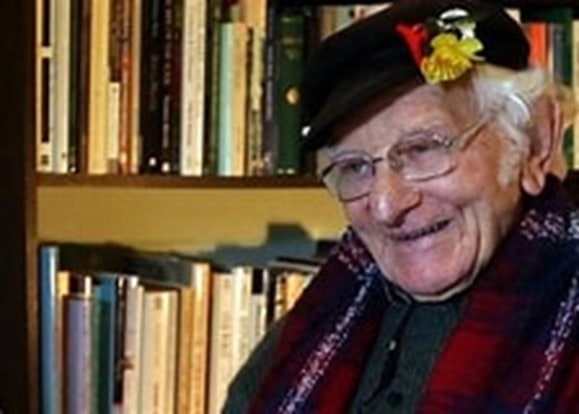paekakariki.nz pays its respects to village scholar and social activist Tony Taylor. Michael O’Leary has written a fitting tribute to Tony, a man of great enthusiasm, knowledge, compassion and integrity.

Antony James William Taylor (1926-2021)
Paekākāriki has lost one of its more colourful citizens. Antony James William Taylor was born at Custom House, London, in 1926. He was an Emeritus Professor in the School of Psychology at Victoria University of Wellington and was the first professor of clinical psychology in the British Commonwealth. His memoir, Cockney Kid: the Making of an Unconventional Psychologist (published by Silver Owl Press, Paekākāriki), describes his family background as being impoverished. Tony grew up near the Docklands, when it was still a real dock land and he went to school in London. He and his friends played on the streets and his childhood was characterised by hunger and quarrels at home because of a shortage of money. During the war he recalled being evacuated with his brother to Weymouth into a foster home, as the London docks were a prime target for the Luftwaffe. On his return to London, he remembered experiencing bombing for 76 nights, and was evacuated again, this time to Newquay, in Cornwall.
Towards the end of World War Two, Tony was accepted into the Youth Entry training scheme for the Royal Navy at age of 16 years; he was commissioned and navigated flotillas of mine sweepers in the Maluka Straits and off the coast of Burma. After three years in the Navy he attended the London School of Economics, training as a probation officer, and then to the Home Office for a six month training school, after which he applied for a job with Sam Barnett in the Department of Justice in New Zealand. His work experience in New Zealand includes group work in prisons, teaching at Victoria University with Ernest Beaglehole, and teaching and clinical work at Arohata Borstal, Wellington. He was involved in Volunteer Service Abroad, where he set up the selection process and was a selection adviser for 12 years.
His involvement with the Quakers extended over many years. He did voluntary work for Antarctica and research with Greenpeace. Other work included involvement in the Alternatives to Violence Project and setting up the first Tertiary Student Counselling Service in 1965. More specifically, Tony was involved in adopting changes in psychiatric hospitals, with particular reference to Lake Alice, ECT and the Pugmire case, along with experience as Forensic Psychologist and child custody disputes. In his work he discusses Gender Identification and refers to John Money’s work with hermaphrodites. His research was important to discussions on transsexual surgery and he was Vice President of the Homosexual Law Reform Society for 20 years.
My personal friendship with Tony Taylor began when he mentioned that he had rediscovered a long-lost taped interview with John Lennon which involved his research into Beatlemania when the ‘fab-four’ came to New Zealand in 1964. From this, he undertook research into the effects of music on audiences. Unfortunately, this was not taken seriously at the time by Tony’s academic colleagues because Lennon was ‘only a Beatle’. It is out of that particular interest that Tony and I worked together on this unique, previously unpublished interview with John Lennon. We published a book through my Earl of Seacliff Art Workshop based on the interviews and the subsequent results of his study. Below is a photograph for the book’s cover which shows a young Tony Taylor interviewing John Lennon.

Tony Taylor will be remembered as a lively, cheerful, and compassionate man who gave much of his working life to the pursuit of social justice and the care and concern for those who didn’t ‘fit in’. I valued his knowledge, friendship and integrity and will miss his presence in our village. I would like to offer my condolences to Alison and his family.
Ka hinga te totara I te wao nui a Tāne
no reira, e hoa, haere, haere, haere …


